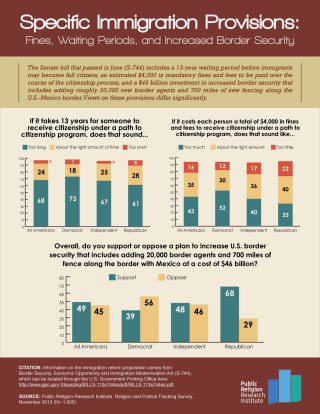Although immigration reform policy is complex and continues to evolve, the Senate bill that passed in June (S-744) includes three key features: a 13-year waiting period before immigrants may become full citizens, an estimated $4,000 in mandatory fines and fees to be paid over the course of the citizenship process, and a $46 billion investment in increased border security. While there is consensus around some provisions, on others, views differ sharply by political affiliation.
More than two-thirds (68 percent) of Americans feel that a 13-year waiting period for someone to receive citizenship is too long, while roughly one-quarter (24 percent) say this length of time is about right, and only 5 percent report that it is too short. There is bipartisan agreement that a 13-year waiting period is too long, with about 6-in-10 (61 percent) Republicans, two-thirds (67 percent) of independents, and nearly three-quarters (73 percent) of Democrats reporting that this length of time is too long.
There is considerably more disagreement among Americans on the appropriate amount in fines and fees that should be required to become a citizen. More than 4-in-10 (43 percent) Americans say $4,000 per person in fines and fees is too much, while a substantial minority (35 percent) say this amount is about right; only 16 percent of Americans believe that this amount is too little. There are stark political differences. A majority (52 percent) of Democrats say $4,000 per person is too much, compared to 4-in-10 (40 percent) independents and one-third (33 percent) of Republicans. Four-in-ten (40 percent) Republicans believe this amount is about right, while more than 1-in-5 (22 percent) say it is too little.
Americans are also divided on whether to increase spending on border security, which would include adding 20,000 new border control agents and 700 miles of fencing along the border with Mexico at an estimated cost of $46 billion. Roughly half (49 percent) are in favor of this proposal, while nearly as many (45 percent) are opposed. There are wide differences of opinion among Americans by political affiliation. More than two-thirds (68 percent) of Republicans support increased border security measures that include additional border agents and fencing. Independents are divided; nearly half (48 percent) favor this policy, while a similar number (46 percent) oppose. In contrast, a majority of Democrats (56 percent) oppose this policy, compared to less than 4-in-10 (39 percent) who favor it.
Despite the evident political divisions on some of the policy particulars, support for the principle of immigration reform that includes a path to citizenship crosses partisan lines. To learn more about what Americans want from immigration reform, please check out the full report here.
Check out the Graphic of the Week here.





